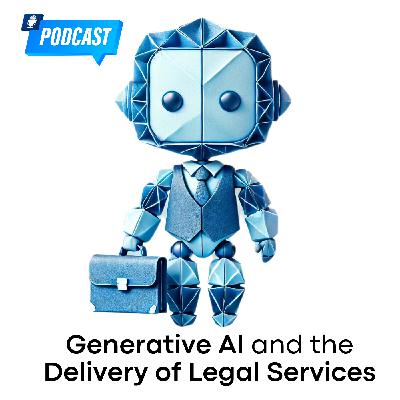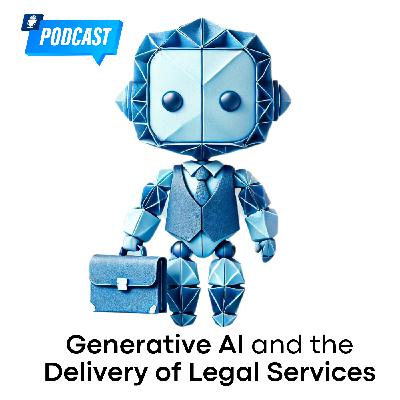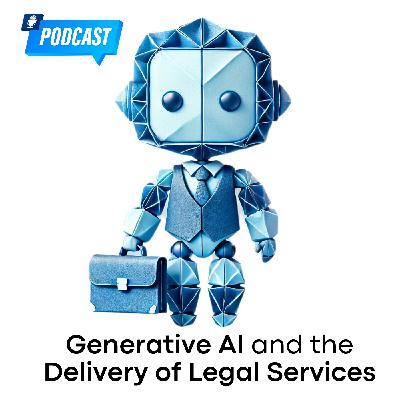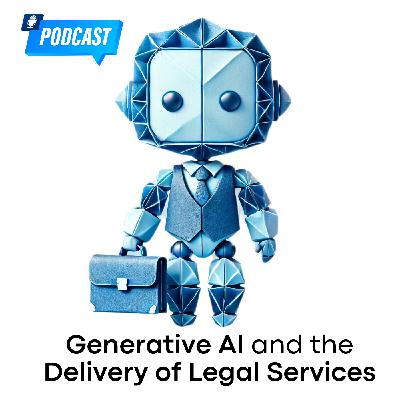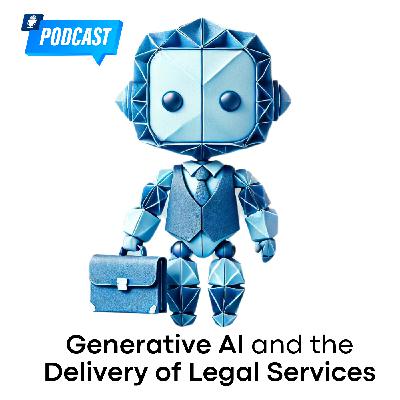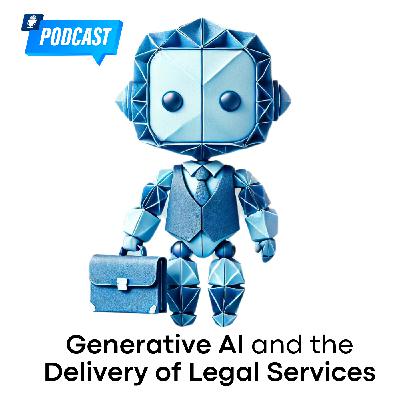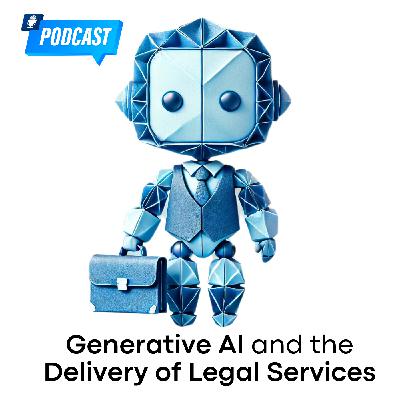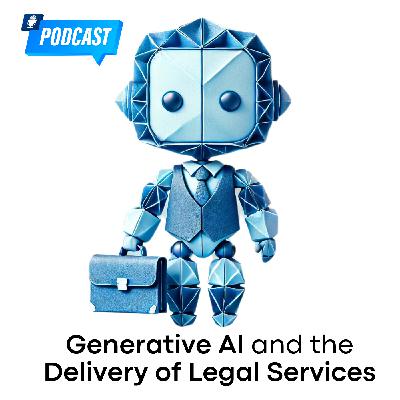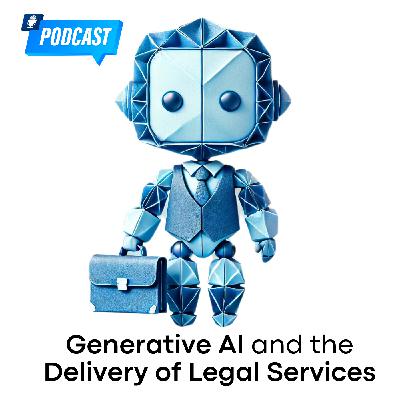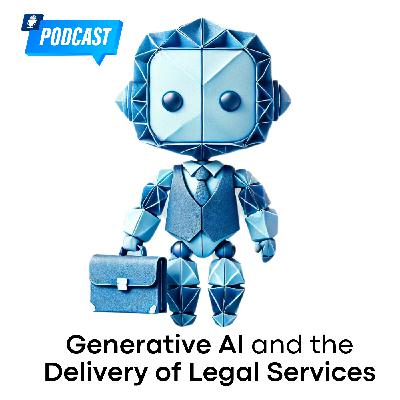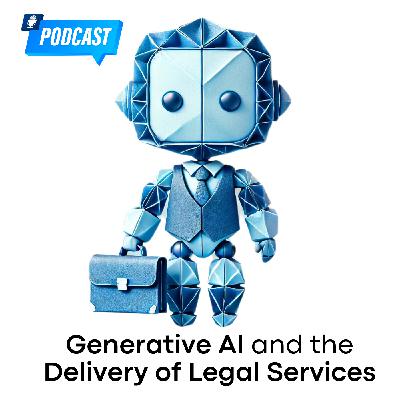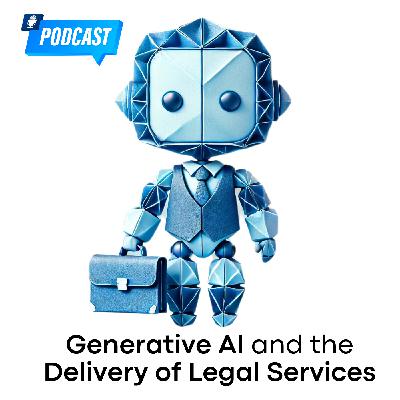Discover GenAI Law Course
GenAI Law Course

GenAI Law Course
Author: Tom Martin
Subscribed: 0Played: 0Subscribe
Share
© Thomas G. Martin
Description
An introductory course to Generative AI and how it is affecting the delivery of legal services.
www.lawdroidmanifesto.com
www.lawdroidmanifesto.com
12 Episodes
Reverse
This is a public episode. If you'd like to discuss this with other subscribers or get access to bonus episodes, visit www.lawdroidmanifesto.com/subscribe
This is a public episode. If you'd like to discuss this with other subscribers or get access to bonus episodes, visit www.lawdroidmanifesto.com/subscribe
This is a public episode. If you'd like to discuss this with other subscribers or get access to bonus episodes, visit www.lawdroidmanifesto.com/subscribe
This is a public episode. If you'd like to discuss this with other subscribers or get access to bonus episodes, visit www.lawdroidmanifesto.com/subscribe
This is a public episode. If you'd like to discuss this with other subscribers or get access to bonus episodes, visit www.lawdroidmanifesto.com/subscribe
This is a public episode. If you'd like to discuss this with other subscribers or get access to bonus episodes, visit www.lawdroidmanifesto.com/subscribe
This is a public episode. If you'd like to discuss this with other subscribers or get access to bonus episodes, visit www.lawdroidmanifesto.com/subscribe
This is a public episode. If you'd like to discuss this with other subscribers or get access to bonus episodes, visit www.lawdroidmanifesto.com/subscribe
This is a public episode. If you'd like to discuss this with other subscribers or get access to bonus episodes, visit www.lawdroidmanifesto.com/subscribe
This is a public episode. If you'd like to discuss this with other subscribers or get access to bonus episodes, visit www.lawdroidmanifesto.com/subscribe
SummaryIn "The Context of Generative AI," hosts Jack and Jill explore the revolutionary impact of generative AI on the legal profession. They trace AI's evolution from its origins at the 1956 Dartmouth Conference through today's powerful tools like ChatGPT, explaining why previous approaches failed to handle law's complexity. The discussion covers how generative AI differs from traditional AI, its current capabilities and limitations, and the ethical considerations for legal practitioners. Perfect for law students and practicing attorneys, this episode offers practical advice on how to leverage AI as a powerful assistant rather than viewing it as competition. Jack and Jill conclude with actionable strategies for incorporating AI into legal practice while emphasizing that human skills like empathy, judgment, and relationship-building remain irreplaceable in an AI-enhanced legal landscape.TranscriptA conversation between Jack and Jill on the transformative impact of generative AI on the legal profession and what it means for aspiring lawyers.Jack: Okay, so picture this. You're a lawyer, right? But you've got this amazing assistant. And this assistant can just whip up legal documents like it's nothing, dig through tons of case law, and even help you come up with awesome litigation strategies, all crazy fast. Doesn't that sound amazing?Jill: It does. And the really cool thing is this isn't some far off sci-fi thing. We're talking about generative AI, and it's already starting to change how the legal world works.Jack: That's what we're diving deep into today. On this deep dive, we're going to unpack what generative AI is, how it's evolved over time, and what it all means for you as you're getting ready for a career in law. Think of this as your guide to this super powerful tech.Jill: We're going to be focusing on the first chapter of [name of source material]. It does a great job laying out the whole landscape of generative AI and how it's being used in legal services.Jack: So before we get into all of that, let's rewind a bit. Before we had AI drafting these legal briefs, it was all about this really rigid if this, then that type of programming. Can you explain why that old school approach just doesn't work in a field as complex as law?Jill: Well, imagine you're trying to program a simple contract, right? With all the different clauses, conditions, all those little what ifs. If you're using traditional programming, it quickly turns into a total nightmare. Just this tangled mess of if this, then that, unless this happens. And except for that, you'd need a supercomputer just to handle a basic contract.Jack: So it's kind of like trying to explain the entire U.S. legal code using only emojis.Jill: Yeah, exactly. You just can't capture all the nuance. And that's where AI comes in. Instead of trying to program every single possibility, which is basically impossible with law, what if we could make systems that learn from data systems that can look at mountains of information and figure out the patterns and rules on their own?Jack: Okay. So that brings us to the famous Dartmouth Conference back in 1956. It's wild to think that the term artificial intelligence was actually coined way back then. And they had this super bold vision to basically create machines that could think like humans.Jill: Yeah. It was a huge moment. That conference really kicked off the first wave of AI research. And back then, the focus was on what they called symbolic AI, basically teaching computers to use symbols and solve problems like puzzles or proving theorems.Jack: But then came those AI winters, right? Like some legal precedent that set everything back. Why did those early attempts at AI kind of fizzle out?Jill: Well, those early systems were promising, but they just couldn't live up to all the hype, you know? They struggled with how messy and complex the real world is. They couldn't handle the sheer volume of information and all the subtle things about human language that you need for something as complicated as law. Plus, the computers just weren't powerful enough back then.Jack: It seems like computing power is a key factor here. Did things start to change with that second wave of AI?Jill: Yeah, for sure. That second wave brought in statistical methods and these things called expert systems. But even then, we were still limited by the tech at the time. Think about it. Back then, a computer that took up a whole room had less power than the smartphone you have in your pocket now.Jack: Wow, that's crazy. So we've had these periods of huge excitement and then disappointment. And now we're in this third wave of AI. What's changed? What's driving this surge in AI that everyone's talking about?Jill: Data, that's the big thing. We're living in this age of information overload, the internet digital records, all of it creates mountains of data every single second. And that combined with the fact that computers are getting so much more powerful. It's been like rocket fuel for AI development. Suddenly these complex algorithms have all the data they need to learn and evolve at an incredible pace.Jack: Okay, so more data, more power. And now AI is going from doing simple tasks to maybe taking on some of the really tough stuff in law. And this is where generative AI enters the picture, right? It's not just about analyzing data now. It's about actually creating things.Jill: Exactly. And to really understand that leap, let's look at this fascinating example from the world of gaming. You might have heard of AlphaGo. It was developed by DeepMind, and it totally mastered the crazy complex game of Go, which for a long time people thought AI would never be able to do, but then they created AlphaZero, and that's where things got really interesting.Jack: AlphaZero. That sounds intense.Jill: It was a total game changer. You see, AlphaZero learned to play Go chess and shogi, not by being programmed with the rules, but by playing against itself. Millions and millions of times. Basically, it figured out the rules and how to win all on its own.Jack: So it taught itself how to win these incredibly complicated games just by playing. That's mind blowing.Jill: And here's why that's so important for law. If AI can figure out something as complex as Go, just imagine what it could do with legal doctrines, precedents, all that case law. We're talking about potentially analyzing legal situations and predicting outcomes in ways that were never possible before. For you as a future lawyer, this could be an incredible tool.Jack: So AI is going from playing checkers to maybe actually arguing cases in court. There's a huge leap. But before we jump into how this will impact your future legal careers, let's break down exactly what makes generative AI different from other types of AI. What sets it apart?What is Generative AI?Jack: Okay, so we've talked about how AI has evolved to be this super powerful tool for analyzing data. But now let's focus on generative AI. It's not just crunching numbers. It's actually creating things. It's like AI went from being a calculator to being a novelist or even a lawyer.Jill: Yeah, that's a great analogy. Think about the predictive text on your phone, right? It suggests the next word you might type based on what you've already written. Generative AI is kind of like that, but on a much bigger scale.Jack: So instead of suggesting a word, it's like suggesting a whole legal argument.Jill: Exactly. These models are trained on huge amounts of data, legal texts, court decisions, contracts, you name it. And they can use that knowledge to create new content, like a clause for a contract, a legal brief, or even a piece of legal advice.Jack: That's pretty mind blowing. But I got to be honest. It also makes me a little nervous. What about accuracy? Can we really trust these AI systems to get the law right?Jill: That's a really important question. And while generative AI is super powerful, it's not perfect. It can make mistakes sometimes and even hallucinate, which means it might generate text that sounds right, but is actually factually wrong.Jack: So like imagine an AI drafting a contract and cites a case that doesn't even exist.Jill: Right. That could be a disaster, especially for a new lawyer just starting out.Jack: Definitely.Jill: That's why it's so important for humans to be involved. As a lawyer, your judgment, your knowledge, your ability to really look at information critically, those skills are going to be more important than ever.Jack: So it sounds like AI isn't going to replace lawyers, but it's definitely going to change how they work.Jill: Absolutely. And speaking of change, we can't talk about generative AI without talking about ChatGPT. It feels like that's when the whole world suddenly realized how powerful this technology could be.Jack: It was like overnight everyone was talking about AI writing Shakespeare or composing music. And, of course, there was a lot of buzz about how ChatGPT could be used in law. What made it such a game changer?Jill: A couple of things. First, the technology itself was a huge leap forward. ChatGPT is based on this large language model called GPT, and it's trained on a massive amount of text data. But what really made ChatGPT different was how accessible it was.Jack: Yeah, anyone could just log on and start using it. You didn't have to be a coder or an AI expert.Jill: Exactly. And that made it much easier for people to see the potential and also the potential risks of generative AI. And those risks are something we need to be really aware of as future lawyers. For example, who is responsible if an AI tool gives inaccurate legal advice? Or what if someone uses these tools to try to practice law without being qualified? These are all questions the legal profession is dealing with right now.Jack: It sounds like the Wild West out there. But even beyond these immediate concerns, there's this bigger, almost sci-fi question.
This is a public episode. If you'd like to discuss this with other subscribers or get access to bonus episodes, visit www.lawdroidmanifesto.com/subscribe


